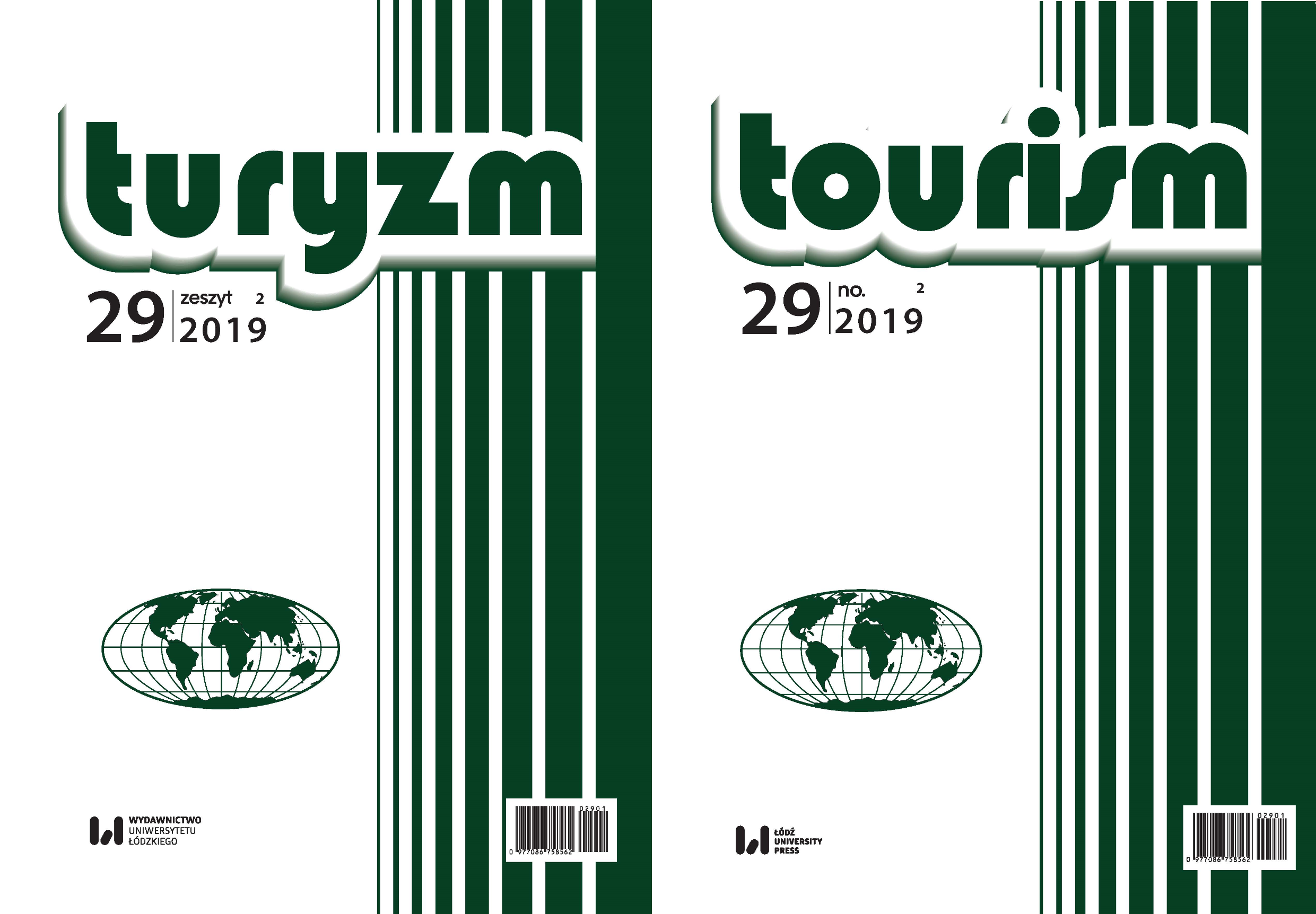Ekonomia współdzielenia i zarządzanie zrównoważonym rozwojem środowiska w sektorze turystycznym w skali globalnej
DOI:
https://doi.org/10.18778/0867-5856.29.2.14Keywords:
popyt sportowo-turystyczny, motywy i bariery, turystyka sportowa, międzynarodowe widowiska sportowe, kibiceAbstract
W artykule zostanie omówiony wpływ rozwoju ekonomii współdzielenia na równowagę ekologiczną w sektorze turystycznym, w skali globalnej, jako że w literaturze jak dotąd nacisk jest kładziony głównie na konsekwencje ekonomiczne i społeczne. Zaprezentowano model matematyczny w celu oceny wpływu ekonomii współdzielenia na dobrobyt jednostek, które uczestniczą w działaniach z tego zakresu w konkretnych miejscowościach turystycznych. Autor opisuje też korzyść odnoszoną przez inne jednostki w postaci ich pozytywnego wizerunku zewnętrznego. Rozwój modelu będzie zależał od wyników przyszłych badań. Z pewnością wykażą one, że ekonomia współdzielenia wraz ze konsumpcją kolaboratywną w sektorze turystycznym stanowią rosnący trend w ekonomii światowej, który również przyczynia się do zrównoważonego rozwoju. Współdzieląc środki produkcji transportu, komunikacji itd., zarówno turyści, jak i usługodawcy są w stanie ograniczyć swój negatywny wpływ na środowisko. Artykuł wypełnia lukę w badaniach nad związkiem pomiędzy rozwojem zrównoważonym a ekonomią współdzielenia w sektorze turystycznym.
Downloads
References
Albinsson, P.A., Yasanthi Perera, B. (2012). Alternative market-places in the 21st century: Building community through sharing events. Journal of Consumer Behaviour, 11 (4), 303–315.
Google Scholar
Alexander, Z., Bakir, A. (2010). Understanding voluntourism: A glaserian grounded theory study. W: A.M. Benson (red.), Volunteer tourism. Theoretical frameworks and practical applications (s. 9–29). Oxford: Routledge.
Google Scholar
Belk, R. (2010). Sharing. Journal of Consumer Research, 36 (5), 715–734.
Google Scholar
Black, I.R., Cherrier, H. (2010). Anti‐consumption as part of living a sustainable lifestyle: Daily practices, contextual motivations and subjective values. Journal of Consumer Behaviour, 9 (6), 437–453.
Google Scholar
Botsman, R., Rogers, R. (2010). What’s mine is yours. The rise of collaborative consumption. New York, NY: Harper Business.
Google Scholar
Butcher, J. (2003). The moralization of tourism: Sun, sand… and sav-ing the world? London: Routledge.
Google Scholar
Dubois, E., Schor, J., Carfagna, L. (2014). Connected consumption: A sharing economy takes hold. Rotman Management, 50–55.
Google Scholar
Frick, K., Hauser, M., Gürtler, D. (2013). Sharity: Die Zukunft des Teilens, GDI-Studie. Rüschlikon, Zürich: Gottlieb Duttweiler Institute.
Google Scholar
Fullagar, S., Markwell, K., Wilson, E. (red.) (2012). Slow tourism: Experiences and mobilities. Bristol, UK: Channel View Publications.
Google Scholar
Glind, P.B. van de (2013). The consumer potential of collaborative consumption: Identifying the motives of Dutch collaborative consumers & measuring the consumer potential of collaborative consumption within the municipality of Amsterdam. Master’s thesis. Utrecht: Utrecht University, Faculty of Geosciences Theses.
Google Scholar
Haenfler, R., Johnson, B., Jones, E. (2012). Lifestyle movements: Exploring the intersection of lifestyle and social movements. Social Movement Studies, 11 (1), 1–20.
Google Scholar
Hamari, J., Sjöklint, M., Ukkonen, A. (2015). The sharing economy: Why people participate in collaborative consumption. Journal of the Association for Information Science and Technology, 67 (9), 2047–2059.
Google Scholar
Heinrichs, H. (2013). Sharing economy: A potential new pathway to sustainability. Gaia, 22 (4), 228–231.
Google Scholar
Jänicke, M., Kunig, P., Stitzel, M. (1999). Study and Workbook Environmental policy: Policy, law and management of environmental protection in state and enterprise. Bonn, Germany: Dietz.
Google Scholar
Kant, I. (2002). Groundwork for the metaphysics of morals. Opracował i przetłumaczył Allen W. Wood. Binghamton, New York: Vail-Ballou Press.
Google Scholar
Lyons, K., Hanley, J., Wearing, S., Neil, J. (2012). Gap year volunteer tourism: Myths of global citizenship? Annals of Tourism Research, 39 (1), 361–378.
Google Scholar
McNeill, J.R. (2003). Blue planet: The history of environment in 20th century. Frankfur, Germany: Campus Verlag.
Google Scholar
Molz, J.G. (2013). Social networking technologies and the moral economy of alternative tourism: The case of Couchsurfing.org. Annals of Tourism Research, 43, 210–230.
Google Scholar
Owyang, J., Samuel, A., Grenville, A. (2014). Sharing is the new buying: How to win in the collaborative economy. Vancouver, BC: Vision Critical and Crowd Companies.
Google Scholar
Pink, S. (2008). Re-thinking contemporary activism: From community to emplaced sociality. Ethnos, 73 (2), 163–188.
Google Scholar
Rentmeester, C. (2010). A Kantian look at climate change. Essays in Philosophy, 11 (1), 76–86.
Google Scholar
Sayer, A. (2004). Moral economy. Lancaster: Department of Sociology, Lancaster University.
Google Scholar
Schiel, F. (2015). The phenomenon of the sharing economy in Germany: Consumer motivations for participating in collaborative consumption schemes. Praca magisterska. Enschede: University of Twente.
Google Scholar
Scholl, G., Schulz, L., Süßbauer, E., Otto, S. (2010). Benefit instead of possessing perspectives for resource-efficient consumption through innovative services. Resource efficiency paper, 12.4. Berlin, Germany: Wuppertal-Institut.
Google Scholar
Schönfeld, M. (2008). The green Kant: Environmental dynamics and sustainable policies. W: L.P. Pojman, P. Pojman (red.), Environmental Ethics: Readings in theory and application (s. 49–60). Belmonth: Thomson-Wadsworth.
Google Scholar
Schor, J. (2016). Debating the sharing economy. Journal of Self-Governance and Management Economics, 4 (3), 7–22.
Google Scholar
Downloads
Published
How to Cite
Issue
Section
License

This work is licensed under a Creative Commons Attribution-NonCommercial-NoDerivatives 4.0 International License.










